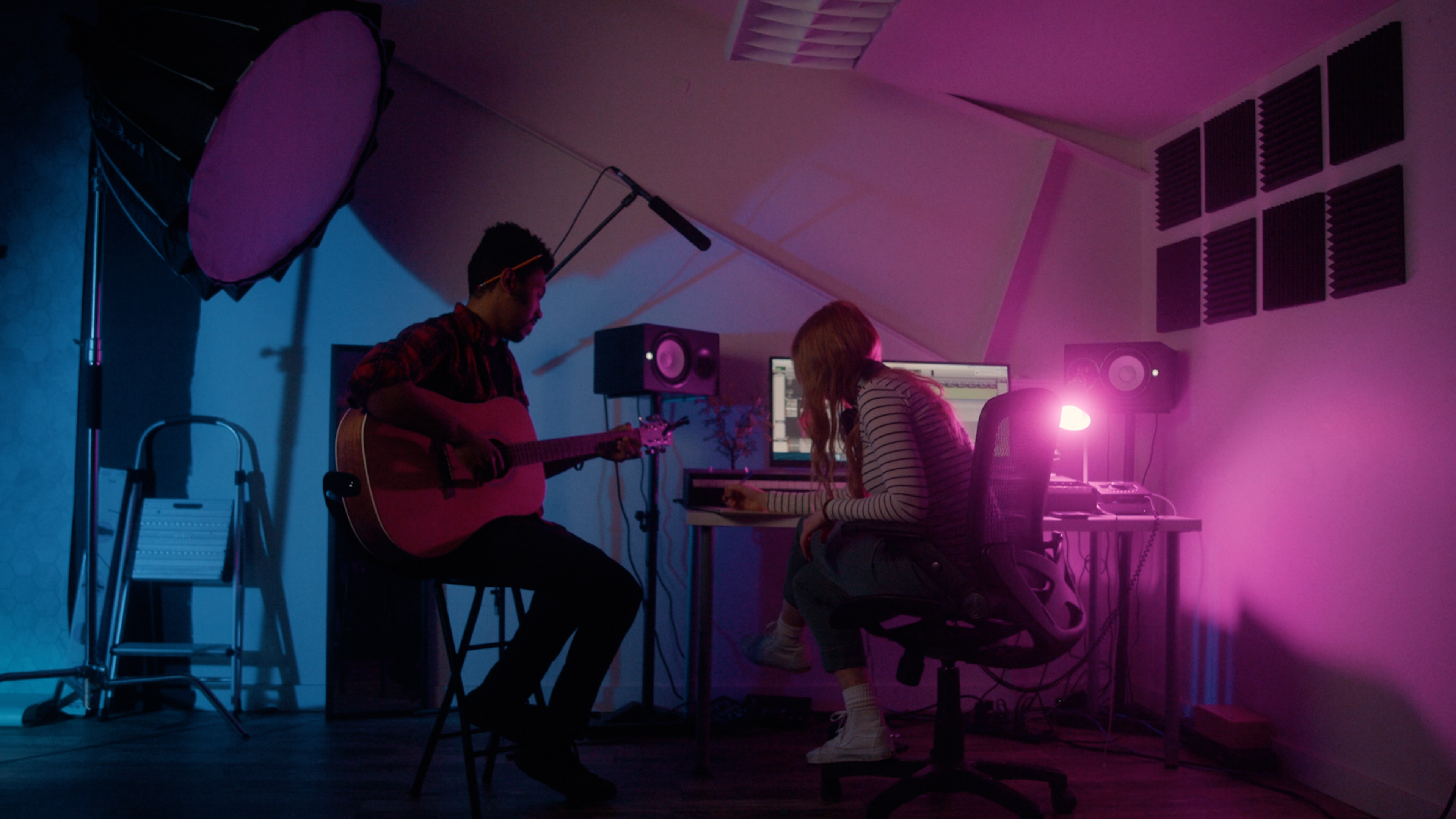
4 Things To Know When Hiring A Composer
I’ve had the unique dual experience of being both a filmmaker and composer. And I’ve used this knowledge to develop these tips.
Continue ReadingBy Filmpac
The following conversation is from Episode 2 of The Steps Podcast. You can listen to it on your favorite podcast platforms through these links:
Or watch the following video, or read on down below. Enjoy!
The following is from a conversation with Kevin Graham, a critically-acclaimed young composer, on his creative start, process, and philosophies.
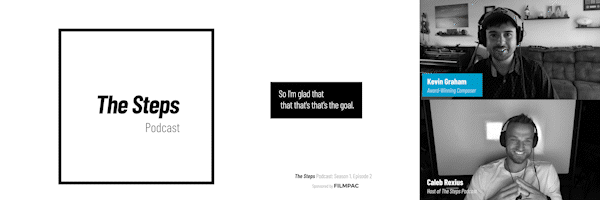
About three or four years ago, I was looking for some music to use in some promotional materials, and I was tired of the typical royalty-free, happy clappy corporate music tracks that I’d been using for many years. I came across this guy who was just crushing it with every song, so dynamic and full, and just a pleasure to listen to, which was rare. That guy was Kevin Graham. Over the past couple of years, we’ve teamed up on many projects and partnerships. Today, we get to hear a little bit about his story.
Kevin, thanks for being on. Tell us just maybe a little intro about yourself, the basics, where you’re from, business, family, kids, pets, that kind of thing.
Kevin:
Sure. Thanks for having me, and thanks for the kind words about the music. That’s always been my goal, has been to not make stuff sound like stock. So I’m glad that that’s there.
Caleb:
That’s the goal.
Kevin:
But yeah. I’m 28 and I live in Eastern Washington, so Spokane, closer to Idaho than to Seattle, for people that may not know the state. I’m married. Don’t have any kids yet, but have a couple of dogs that we probably give too much love and attention to. That’s my situation right now. I’m a professional, full-time working composer for licensing and media and film, and I love every minute of it.
Caleb:
Nice. Yeah. Part of what I love talking to creative professionals about is the steps that got them to the point they are now. And so, I’ve broke it into five steps, and they’re not always in this order. Sometimes it’s a bit… Someone’s path looks differently than someone else’s. But for me, it’s like step one is introduction. Step two is the development and refining of your craft. Step three is that leap, that moment where you’ve got to take a risk. Step four is the grind after that, of making it happen. And then, step five is the reward. That’s a tough one. You don’t really maybe even know that you’re in it when you’re in it. So let’s go to step one. Could you maybe tell me about the introduction to your craft, your first exposure to the music realm.
Kevin:
For sure. I mean, not that there’s, I guess, a standard way for somebody to get into writing music for a living. But I feel like I definitely had a little bit of a unique path to get to this point. Growing up, all I ever did was play guitar. Guitar was my thing. I was in bands all in high school. I loved heavy music, and metal, and rock and stuff and-
Caleb:
A lot of electric guitar.
Kevin:
Yeah, yeah. Electric guitar. I have an acoustic guitar. I can mess around on it, but electric guitar is my main comfort zone there.
Caleb:
Nice.
Kevin:
Yeah. I fell in love with that instrument, I think probably because my dad played acoustic guitar. There was always a guitar lying around the house when I was little, so I would always mess around with it. I took piano lessons when I was younger, but I just didn’t have the attention span for that. I just wanted to play guitar.
Caleb:
Yeah. That helps so much too. It helps so much too when you can have, I think, either a friend, or a parent, or a sibling who’s paving the way a little bit. I feel like that can really help. Not everyone has that. Honestly, I think part of my story is I didn’t really have that. But I wish I had, and it sounds like you did. And so, yeah, that’s really cool.
Kevin:
Yeah.
Caleb:
Shout out to dad for doing that.
Kevin:
Yeah. And I took lessons. The lessons was what I credit for introducing me into just music in general. I mean, I learned theory on a fretboard, not on a keyboard, which is backwards for a lot of people and-
Caleb:
Tough.
Kevin:
Yeah. I got a degree in audio technology because I wanted to be able to apply that towards being Obsession guitarist or whatever. Through that, I got an internship and then a job at a production house, a production studio here in town doing post-production audio work, because that was-
Caleb:
How old are you at this point?
Kevin:
I was like 19. This is almost-
Caleb:
Okay. Pretty young.
Kevin:
Yeah. Because back then, I couldn’t… There was like two recording studios in town. Again, Spokane’s not a large metropolitan area. I couldn’t see a way to make a living just writing music at that point. Just getting this internship, I didn’t know anything about filmmaking, or the production world, or post-production. I learned so much doing that. I eventually got hired there to do that. Started diving into the actual visual side of things, filmmaking, and cinematography, and editing, and stuff like that.
Kevin:
That launched, I would say, seven or eight-year, to at this point, career in filmmaking, which ended up being my main day job. I ended up starting a company with a business partner, running that for a while, because at least that was something where I could provide for myself and my family doing. And then I was still doing all the music stuff basically just on the side. It was always my passion and what I love to do, but just couldn’t, at that point, find a way to make that work and be my full-time thing.
Kevin:
I’m a very risk averse person. Like I’m not the type of person to just… Maybe then I should have, since I was so young. I didn’t have as many obligations, but-
Caleb:
You were started. You were getting maybe paid or it was maybe easier, in some ways, to have a career in video and that multimedia side, versus composing and songwriting. I see that too. I feel like it’s super competitive. I mean, a lot of their creative professions are very competitive. But when I think of making music, it seems like almost everybody wants to do that. That’s the dream.
Kevin:
It’s loud out there.
Caleb:
And so, I guess… It is, yep. It can feel saturated. I feel like there’s always room for people. This goes into a lot of, I think, industries. There’s always room for someone who’s willing to be innovative and really to pursue excellence. There is a place for you. And so, I guess, tell me about a little bit of maybe that leap you made from the safety net, let’s call it, of the video and multimedia creation, into hey, jumping into music. Tell me a little bit about that, that leap, especially for someone who’s risk averse like yourself, like how did that feel? How did you do that? How did you take that step?
Kevin:
Yeah. There were, I guess, a bunch of mini leaps to get to that point. For me, it wasn’t just one big leap. I mean, if I’m just thinking of big moments or milestones, while I was still an intern at that production house, I scored my first commercial. So that was cool, just being like, “Hey, I just got paid… I made 200 bucks to score this commercial, but I did it and it got accepted by the client and it’s being on air and stuff.” When you’re a 19-year-old kid who just heard about Pro Tools the year before, that sort of gratification is everything.
Caleb:
Yeah. I think I can resonate with that as well. I remember my first paid video project, and it was exhilarating. It was 500 bucks that I got for this massive edit. It took me so long and I had to drive two hours back and forth to go get this hard drive, and so many revisions. It was a huge many hours sunk into that. My hourly rate was very small, but it was the first time in my life that I actually got paid to do something like…
Caleb:
To have some creative freedom, some creative expression, and then getting paid for it, and though it was a small amount. That was a really monumental shift for me in my mindset of like, “Hey, if I can find one person to pay for my skillset, I bet I can find some more.”
Kevin:
Absolutely. Yeah. Yeah. Just knowing that what you’re doing can bring value to other people, and you’re not just doing it for yourself, I think is a huge booster in… It’s like, “Hey, now I feel comfortable dedicating a lot more time and energy to doing this, if I know that it could potentially be something that makes sense for me to do.” There was another time, a couple of years later, I won a American Advertising Federation award for a custom score that I did for a short film, which was cool.
Kevin:
Just again, not that those subjective awards or anything means anything, but it lets you know that you’re on the right path. Like what I’m doing isn’t totally terrible because somebody liked it. But yeah, I think the biggest thing that just let me really realize that I could someday do this full-time for a living was as a lot of more affordable licensing platforms became available to filmmakers, which to me shifted the dynamic of the production music landscape significantly, probably over the last seven years.
Kevin:
That same dynamic is happening for songwriters and composers. Not only is really high-end music becoming very available to filmmakers on platforms like FilmPack, where they can get music, but those avenues are becoming more widely available for composers, where before that you would have to be with a major record label or you’d have to be one of the very select few people on a super high-end licensing site where they’re basically sending you briefs and you’re doing everything work for hire.
Kevin:
When I started to see interest and getting paid, just putting my music out there for licensing and seeing that people actually had a demand for it and they started using it, that was the main thing that spurred me to be like, “Hey, this is something that I should be pouring like a lot of time into, and I think I could make it work.”
Caleb:
Awesome.
Kevin:
Yeah.
Caleb:
I love to hear that. I guess I want to take a step back and think about your day to day, or maybe your week to week, or even month to month. Maybe talk about some of the harder, more difficult aspects of being a creative professional. I think sometimes we can get caught up in talking about the coolest stuff, and the awards, the ad placements and stuff. But there’s a really horrible side of being a creative professional.
Caleb:
I’ve got to experience a lot of that, I know, and I’ll share some of mine as well throughout this series. But I guess, for you, my question is, yeah, maybe walk us through some of those more difficult aspects of maybe working for yourself or being a composer and all of that.
Kevin:
Yeah. I think any creative work that you do, there’s going to be a little element of this that I deal with. It’s just like being your own worst critic, being a perfectionist. Those are two of my, I think, biggest faults. I’m very much sometimes get sucked into the imposter syndrome world where it seems like you’re never going to write a good note ever again, and everybody else is just out there absolutely crushing it. But then I’ll go back and listen to that project a month later and it’s like, “That was good. I don’t know what I was thinking.”
Kevin:
It’s really easy to compare yourself to others and to just nitpick your work to the point of it not even being productive anymore. You probably know, as a filmmaker and an editor, sometimes you just have to know when to walk away from an edit or an animation or something.
Caleb:
Yes. I think too this is something that I try to communicate to young creatives, is pursuing excellence, that’s good. That’s a good thing. Perfectionism is just paralyzing.
Kevin:
Yeah.
Caleb:
It’s paralysis. My story is a little bit unique, that I came at filmmaking from a business perspective. I actually graduated from University of Oregon with a degree in corporate finance. I do nothing like that. I hardly even can look at a balance sheet anymore. But I think one mentality I took to my craft was thinking business first. I knew that once you get into that perfectionist mindset, you just lose so much time and so many hours. It’s tough to be profitable, I mean, just from a practical standpoint, it’s tough to be profitable.
Caleb:
It’s tough. Sometimes you’ve just got to know when to cut, when to stop and just move on to the next thing. I can relate with that. I try to be super aware of when I’m getting into that like perfectionist region and just stop, dial back, move on.
Kevin:
Yeah. Yeah. Same. For me, it’s my easily my biggest fault, because it’s so much easier said than done, like talking about it right now in an interview versus when I’m halfway through a project and I’ve got 50 tracks going on. I’m just like, “Man, I really thought this was going to turn out different. I could walk away from this now, but what if I just do this one more thing?” And then, seven hours later, I’m still just adding…
Kevin:
But yeah, I think in our industry in particular, which is creating media for licensing use, there has to be that… Everybody just, you have to find that line between those two things, between making something that’s your own and unique and working to your strengths, but also just creating a workflow and a process that makes sense to where you can just be profitable at it. And it makes sense financially or from a business model perspective.
Kevin:
I mean, I used to make like an album a year. That’s how much time I would take with stuff, and it was great. That was just this random little supplementary thing I was doing on the side, but I loved doing it. It was awesome. But then as I started to get more entrenched in the world of writing music for a living and making these other relationships with other composers and learning how they work, and even taking on more and more licensing gigs and having to force myself…
Kevin:
I remember there being a very clear disconnect or a very clear moment where I started just making myself write a lot of music, like write music every single week. Whereas before, I would just let things always come to me. I would never stress anything. All of a sudden, I’m finding myself having to actively just think of ideas, and if I can’t think of an idea, just pull up some random patches on the keyboard and mess around with them until I think of something and then just do that.
Kevin:
I think that helped me grow as a composer a lot, to be able to write music faster and learn more. And not necessarily sacrifice quality, but just teach myself mentally that, hey, like not everything has to be, in your mind, just a perfect work of art. There’s going to be a need for it and value for it with content creators, as long as you just do your due diligence in making it useful to them.
Caleb:
Yeah. Along the same lines as that is, one thing I felt is, sometimes some really interesting creative work has come out of having really limited constraints too, of like a limited time, or like in your case, maybe it’s a limited amount of sounds or patches or plugins. All of a sudden, you’re forced to make something cool out of very little. It’s time, resources, money, whatever. That’s been something that’s fun to look back over the years and think… Look back at some old projects and be able to just tell stories about like, “Oh, this one video that has gotten so many views and likes, and has gotten me so many jobs, literally I shot that in one afternoon with my baby boy,” or something at the park.
Caleb:
That’s one video actually that I did. And so, yeah, it’s interesting what inspires certain creativity. One thing I wanted to ask about is like… This is a point where actually I want you to brag a little bit. I want you to tell, for our listeners, what is something at least that you feel like you personally do really well or something that you do exceptionally, and that has contributed to your success and has got you to where you are now? Like I said, this isn’t a time to really be humble. Don’t be shy. I want to hear, I want you to be able to share with our listeners, maybe something that you’ve been able to accomplish or some sort of work ethic or something like that. Something that you’re really good at.
Kevin:
Sure. I mean, I do think I have definitely just inherent talent at being creative, at creatively telling a story. I’ve always been, I think, good at writing, just physically writing. I feel as though I can pretty seamlessly convey ideas from my mind into something tangible, whether it’s edit that I’m working on, back in the day for video, or now, like a music track. I do think I have that inherent talent, but I think my strongest attribute that really has helped me get to this point and do what I do is I’m so incredibly stubborn.
Kevin:
Going back to that perfectionism, I’m very stubborn with myself and I just sometimes will refuse to let a track out the door until I know that it’s ready. It doesn’t mean that it takes a lot of time. Part of that learning has been to be able to figure out quickly what’s wrong with the track and quickly fix it. Maybe the solution is to just take out this… I can’t get this one particular instrument to work, I’m just going to take it out. Whereas before, maybe I would have tried to double it or layer it or spend eight hours on it.
Kevin:
But I think I’m very stubborn at just not ever letting that quality level dip, at least in my mind and my perception. Also, I’m willing to put in the grind and the work. I mean, there’s a lot of people out there that are willing to work hard, and I don’t think it’s a super unique thing. But it’s something that I think I’ve noticed about myself, that I’m willing to stay up late and get up early and just do what I need to do to make it happen.
Kevin:
Because, I mean, again, before the last year and a half or so, music wasn’t… I had a full day job that wasn’t even music. Music was just early mornings, late nights, weekends, a lot of free time and effort and energy being poured into that when my friends are all out having fun and stuff. I’m not saying that you have to become like a hermit and just shut yourself away. But I do think there’s just a certain amount of time that you have to spend on a craft like writing music, in order to just get to a point where you can translate it into giving you more opportunities. I don’t know. Is that a good answer? I guess stubbornness and hard work ethic would be my main thing. Yeah.
Caleb:
Yeah. It’s always a mixed bag. It’s like the things that probably make you good at what you do are also what make you bad, or it can be hurdles as well. It’s funny, when you were saying that, I had a memory too of when I was getting started making videos and I was working full-time, normal desk job, finance, whatever, that kind of stuff. I’d come home at night and be working on videos and creating stuff. I’d be up till like midnight, 1:00, 2:00 AM.
Caleb:
Sometimes I was getting up then at 4:00 AM to get in half day or almost a full day of video work prior to my normal work, and looking around at some of my friends who were just living it up. Maybe they’re still in grad school or college, and I was relatively young, I guess, still. Yeah, tough, man, but it’s hard work though. I guess that is one probably common thread through any of the creative professionals that we’ll probably talk to on this podcast. It’s just always work ethic. There has to be.
Caleb:
I don’t think you can make it as a career creative professional without a strong work ethic. That doesn’t mean you can’t be talented. You can be very talented and you can do it on the side for fun or whatever, and that’s great. For some people, maybe that’s the way to go. But if you really want to make a career out of it, it takes a lot of grit and hard work. Yeah. You answered what my next question was going to be, was saying something that you could get better at, could improve at.
Caleb:
I guess, one thing I wanted to ask you, I feel like there’s probably a lot of listeners that would look to your position, or maybe even my position, and be like, “Hey, how do I get to where Kevin is in five years?” My question to you is maybe what advice would you give Kevin Jr, or little Kevin, five years ago, what advice would you give? What would you tell that person?
Kevin:
Sure. I’ll give a general one and a specific one. In general, I think what I would tell five years ago Kevin is don’t sell yourself short and don’t be afraid to try to push your music out there more. Not necessarily just shameless self promotion or posting about… There were so many libraries I’d never submitted anything to, so many opportunities I never even tried to get my foot in the door with, just because in my mind, I’m like, “Ah, I’m not there yet.”
Kevin:
But now, looking back, it’s like maybe I was. The more ingrained in this industry I get, and the more relationships I build, and the more people I meet… Music creation as a whole today, and even just the music licensing or music for video industry, it’s so fluid. It’s changing so much. Even everybody who has made it and knows what they’re doing, they’re still figuring it out as they’re going along. I was always waiting for this perfect time of like, “All right, now I’m a good composer. Now I can start trying to send my music everywhere.”
Kevin:
I don’t think that moment ever comes. I think you just have to believe in what you’re doing. And if you feel that what you’re doing will bring value to other creatives in their projects, then there’s no better time than yesterday to try to make that happen. Just super specifically, I’ll hammer home again, don’t be afraid to make music that isn’t coming from the absolute, most amazing purest place of inspiration. You don’t have to wait for something to just fully come together in your mind over the course of a year before you go start creating it.
Kevin:
Even if you’re starting out, hey, I want to make a track a month, and then try to make a track a week, and then try to make three tracks so we can see if you can figure out a workflow and your tools and get all your sounds dialed in to be able to do that consistently at a high quality level, you’re only going to be making yourself more profitable and more useful to anybody else who would want to use your music.
Caleb:
There’s a quote that my brother, he sent me a couple of years ago, and that really resonated with me. I’m probably going to butcher it, but I think it said, “The test of a true professional is whether they can create excellent work even when they’re not inspired.” I think that’s what you’re saying, it’s like sometimes you get the gift of inspiration and you’re just rolling. You just get lost in whatever project you’re working on.
Caleb:
Other times, and for me it feels like most times, especially over the last few years, it’s you’re just having a grind, and you’re just having to just make stuff, even though you’re tired. You’ve got creative fatigue, all that. You’ve just got to grind and make something happen.
Kevin:
Yeah. Totally agree. I once worked for a brief time in a music production studio with a very, very good high-end composer, doing all sorts of stuff for trailers and stuff. One of his favorite quotes was, “If I wanted art, I would have called him.” His whole thing was just, anybody can sit there and take inspiration and make something awesome. If you really want to make it in this industry, that skillset that you have to learn over time is doing exactly what you just said, being able to still deliver at a high level when that inspiration isn’t just flowing into your mind.
Kevin:
I have some tracks that write themselves. I’m sure you have some projects that shoot themselves or edit themselves. But for every one of those, there’s 10 or 20 or 50 or a hundred ones where you just have to grind and find a way to… I mean, I don’t want to say fool them, like fake it, but just find a way to keep that quality high even during those times when it’s not just the easiest, most inspiring thing. So I think that translates music video across the board.
Caleb:
Yep. Agreed. Speaking of those kinds of projects, I’m curious, what’s your… Looking back and maybe your past, I don’t know, five or it’s almost 10 years now, what would you say is your most fulfilling project that you’ve done?
Kevin:
My most fulfilling project, I’ll give you two of them. The first project I ever did specifically with the intent of having it used in videos, and it ended up having a decent amount of success in licensing was probably my most fulfilling project. It was a little collection of five epic tracks called Apex, just because it was the first project I ever wrote going into it. Not just wanting to write music that I thought was cool, but just going into it thinking like, “I want this stuff to be used in a bunch of videos. I want this to be used in epic videos.”
Kevin:
Writing that and then having it have the success that it had, and seeing some of the projects that use some of these tracks… I mean, you’re talking stuff from like Bugatti and the Kia and Major League Soccer, just these high-end brands use these tracks. That was my goal when I was going in. Just seeing that thing tie together and come full circle, for me personally, was really fulfilling.
Kevin:
Then there’s another, just a personal project I did back in 2019, where it was just… At that point, that was my first year of really grinding and doing a ton of licensing work, and library work, and production work. I hadn’t really written any music besides that for a year and a half, which that was the first time in my life where I had gone that long without just creating anything for myself. I did a project, yeah, back in 2019, just called Montana. I think it was just three tracks, just some ideas that I had.
Kevin:
I didn’t give myself any expectations or limits or anything, and those turned out good. I find that every now and then, you just have to do something like that. You have to just get some creative energy out of your system. You have to get some of those ideas out. Then that way you feel more refreshed and rejuvenated to jump back into the grind of doing all these other things. I just remember writing that album was just a big creative release, which was awesome. I think we had a couple of those songs even play at our wedding the next year. Found some use for them.
Caleb:
Speaking of experience, I guess, tell me maybe about one of your bigger fails that we talked about, things that you feel like you could work on or improve on. I guess, I’m curious, a specific instance where you just… A massive failure. Now, this can be funny or maybe more on the serious side. But I guess I love watching like fail videos, just capturing little moments of people’s biggest fails of their life. I’m curious, when you look back at your career thus far, what’s a big fail?
Kevin:
I’m trying to think of one that’ll play well on the podcast. In the world of filmmaking, we’ve all shown up to set and left all the batteries or cards or whatever back at the studio or whatever. But I’m trying to think of a music-related one. Man, I’ve created such terrible music before, like-
Caleb:
In your early days or still now you feel like?
Kevin:
Early days. The studio that I was interning at, I did a ton of work to take their system that they had there and try to turn it into a full on 16-track recording studio. Actually, I think we had like 24 tracks of IO there. I had this whole scheme set up to where I could like monitor everything upstairs in this control room. We ran a snake, which is just a ton of audio cables consolidated into one big cable down into this big open space on the main floor where I wanted to record live drums and strings or whatever.
Kevin:
We got it all up and running and I did a few sessions and it was the worst sounding room ever because it was just this big open room. I don’t know. I don’t know if I just hadn’t got to that point in my degree or school where you learn that acoustics do actually matter when you have a big space, but-
Caleb:
Yes.
Kevin:
I don’t know. I spent a lot of time trying to get that space tuned into being a full-on recording studio. And after about four demo sessions with bands, it was very clear that it was not going to happen and I should probably just get really good at virtual instruments instead. That’s the only specific one I can think of.
Caleb:
Yeah, that’s good. I mean, I have so many when I think through. I’ll share mine on a different episode. But I guess I’m thinking of someone who’s maybe listening to this and they’re like… Man, they’re getting ready to graduate college or wherever they’re at in life, and they’re thinking like, “Hey, man, I want to pursue this.” Because you say maybe like…
Caleb:
Not to scare someone away, but maybe what’s one risk or one reward, but I think I’m more concerned about what’s one risk that they may not be considering, so they’re not surprised when they hit it? What’s maybe one risk that you’ve felt that was maybe a surprise to you or something like that?
Kevin:
Sure. I think maybe one thing that somebody just getting into this industry… I don’t know if it’s necessarily a risk, but definitely something that they may not understand or consider until they get into it, is just how rapidly things change and how rapidly the landscape of the industry evolves on so many different fronts, whether or not it’s the specific… Even getting into just the specific avenues you have to sell your music on. Those are always coming and going.
Kevin:
Things are always changing with the way that companies are working and how they’re sourcing their material. But even just more on a macro scale of just content. Content is changing. I mean, 10 years ago, a two-minute video was considered short. Now it’s considered like four times too long and nobody wants to watch it. 10 years ago, TikTok didn’t exist. 10 years ago, Facebook and Instagram were still in their infant stages. They weren’t even under the same company.
Kevin:
There’s so many things that evolve in the landscape of content creating, that has a very direct effect on music creators for content, that you just have to be willing to be very flexible and to always be learning, and to always be making a point to have your finger on the pulse of the industry and to be learning. That’s my main thing. Because I just assume, it’s like, “Oh, I’ll become a music maker, and then I’ll just make a bunch of music and that’s it. It’ll be like that forever, happily ever after.” It changes all the time, man.
Caleb:
It’s true. I think the sad part you see sometimes, and I see this in my industry, and I’m sure you see it too, is dudes who were maybe crushing it 10 years ago, 15 years ago, but they lost touch. They lost the pulse-
Kevin:
100%.
Caleb:
… on where things were heading and what’s contemporary, and you can tell everything that they output is old fashioned.
Kevin:
Yeah. 100%.
Caleb:
It’s just out of style. It’s sad because, man, they were so good in their hey day, but, man, they just didn’t keep up. And so, that’s something like almost… It’s a fear of mine. I try to gather as much data as I can from different platforms, social media, Vimeo, YouTube, what’s happening on TV, even into podcasts and where radio is headed, all this. Try to gather… And so, I have a really good idea of where content is headed and what is it sounding like, and what is it looking like?
Caleb:
And so, yep, I think you’re right on with that one. It’s always changing. You’ve got to stay up with it. Last question for you is the dream, I don’t know, five years, 10 years from now, whatever your dream horizon is, where would you like to see yourself? What would you like to see yourself doing five, 10, 20 years from now?
Kevin:
Are we talking professionally or just in general?
Caleb:
I’m talking professionally.
Kevin:
Yeah. Probably just professionally. I mean, I think most of my goal, things like that, are just internally where I would like to be with growing as a composer. At this point, I’m a full-time working professional composer. I hope to still be doing that 10 years from now in the same… I hope to be just still putting as much of myself into my craft then as I am now. But man, it’s hard to place tangibles on it. Because I think of my abilities 10 years ago and I’m like, “Man, I was terrible.”
Kevin:
And so, I wonder if in 10 years from now, I’m going to look back on where I am right now and be like, “Man, I was terrible.” I hope I do. I just-
Caleb:
Well-
Kevin:
Yeah.
Caleb:
One thing I think-
Kevin:
I’m trying to do some tangible, I just can’t.
Caleb:
Yeah. Well, one thing I was hearing there, and you can correct me if I’m wrong, it’s like even how you let off your answer with like, “Hey, is this a professional or more personal?” I think it’s hard to distinguish. I think if my professional goal was to be the next Christopher Nolan, that would impact my personal life, I think. I think what you said is like, “Hey, I’m a career composer.” In some ways, you’ve already made it. How do you just maintain it?
Caleb:
I think that’s a good thing to consider, I think for a lot of people, as they’re getting into this, is because the higher your professional aspirations are, the greater impact it’s going to have, I think, on your personal life too. I think, for me, at this point in my life, I don’t have the goal of being some major big blockbuster movie director. I think that there’s some people that can balance that with their personal hobbies and family life and all of that.
Caleb:
To me, my personal life and my family, investing into my wife, and my kids, and my community is a very high priority. I limit what sacrifices I’m willing to make on the professional side to get there. Actually, I like your answer. It’s like, “Hey, how do we just keep this thing going?” I know you personally a little bit too, is you have a good personal and professional life balance, I feel like. That’s something we haven’t touched on, but I think it’s super important.
Caleb:
It’s healthy for your creative mindset I think as well too, when you can bring in real life experiences. I’ve had seasons where it’s a couple 70, 80 hour weeks in a row and you’re so just done after that. So exhausted. Sometimes after a weekend or a good week, or even a long vacation, I come back and I’m like, “Hey man, I’m ready to roll,” and I’ve got some ideas I’m bringing in. It’s a little bit abstract, but I’m bringing in some life experiences into this next project, or this next song. And so, I actually like that.
Kevin:
Yeah. That’s why I asked, are we talking professional or personal? Because, to me, they go hand in hand. I mean, just to piggyback off that real quick. Yeah. A lot of people are like, “Man, you’re going to be scoring movies someday,” or like, “You should move to Hollywood.” I’m not trying to become the next Hans Zimmer. I’m not trying to become the next John Williams. It’s just not on my radar. I just want to be me, and who I am is somebody who, like you said, my family is very important to me.
Kevin:
My family life is very important to me. That’s probably why I’ve always been very risk averse financially. But yeah. If I can find a way to be me and not Hans Zimmer, but still provide value to others with what I do and provide for myself and for my family using that value, then that is the dream for me.
Caleb:
Yep. That’s the win.
Kevin:
I feel like I’m working hard towards that right now. If that’s still the case in 10 years, I’ll be very happy.

I’ve had the unique dual experience of being both a filmmaker and composer. And I’ve used this knowledge to develop these tips.
Continue Reading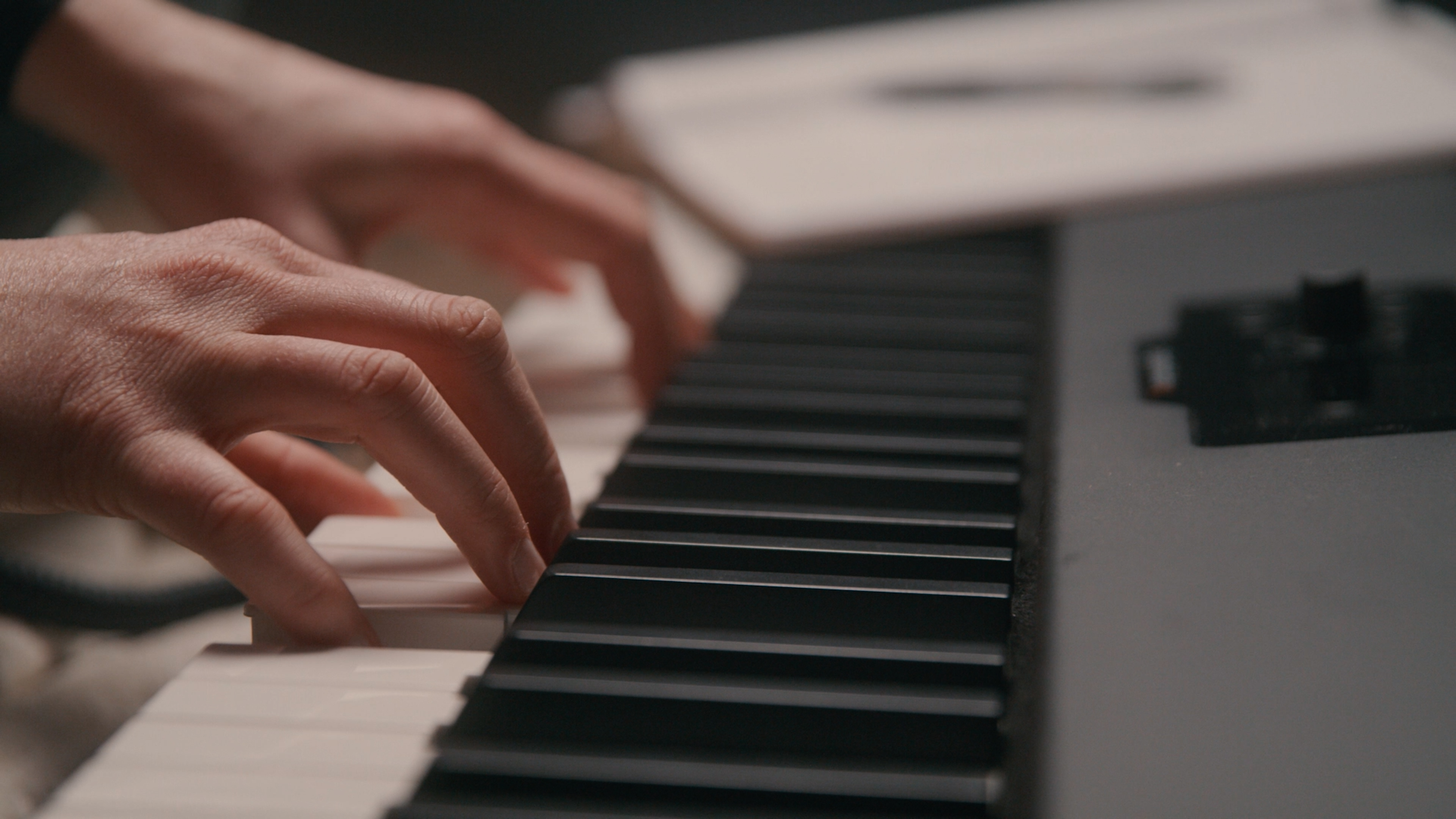
There are basically two ways to get that music: either hiring a composer, or licensing pre-existing music from a stock website.
Continue Reading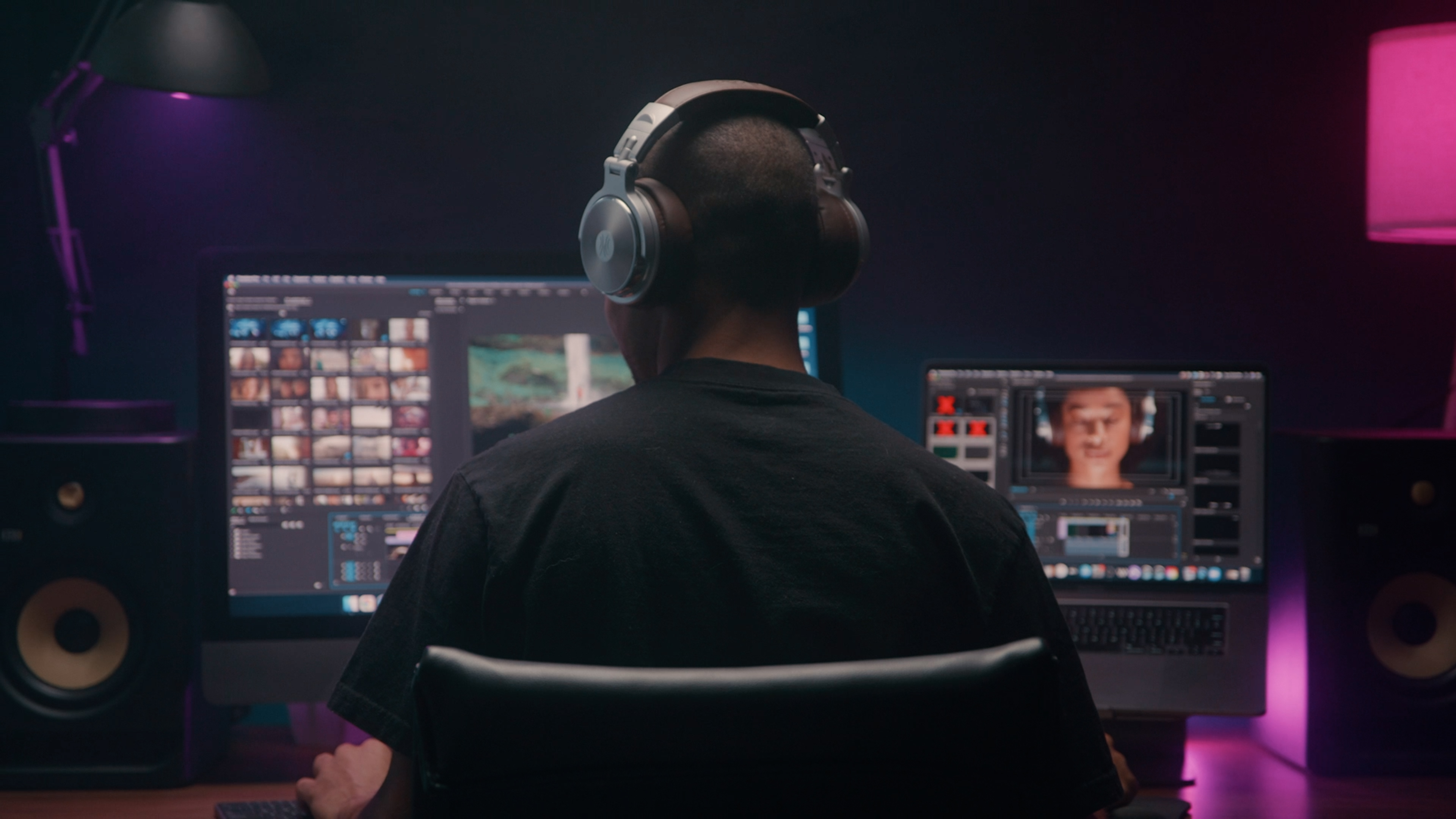
An audio limiter is a great tool to help you control your video’s loudness. We explain when and how to use one here.
Continue Reading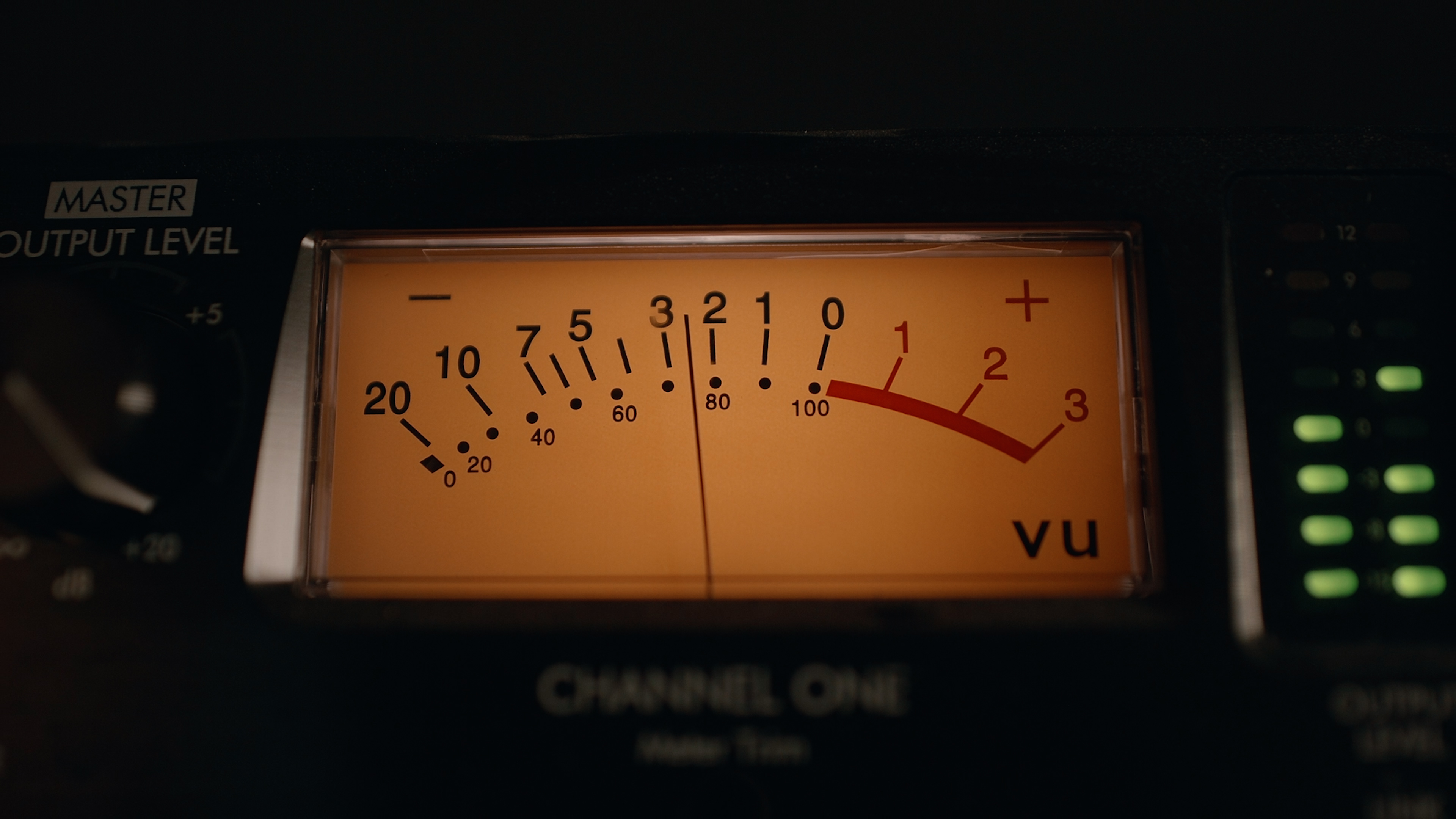
One of the most useful audio effects in video post production is compression. This article explains what it is and when to use it.
Continue Reading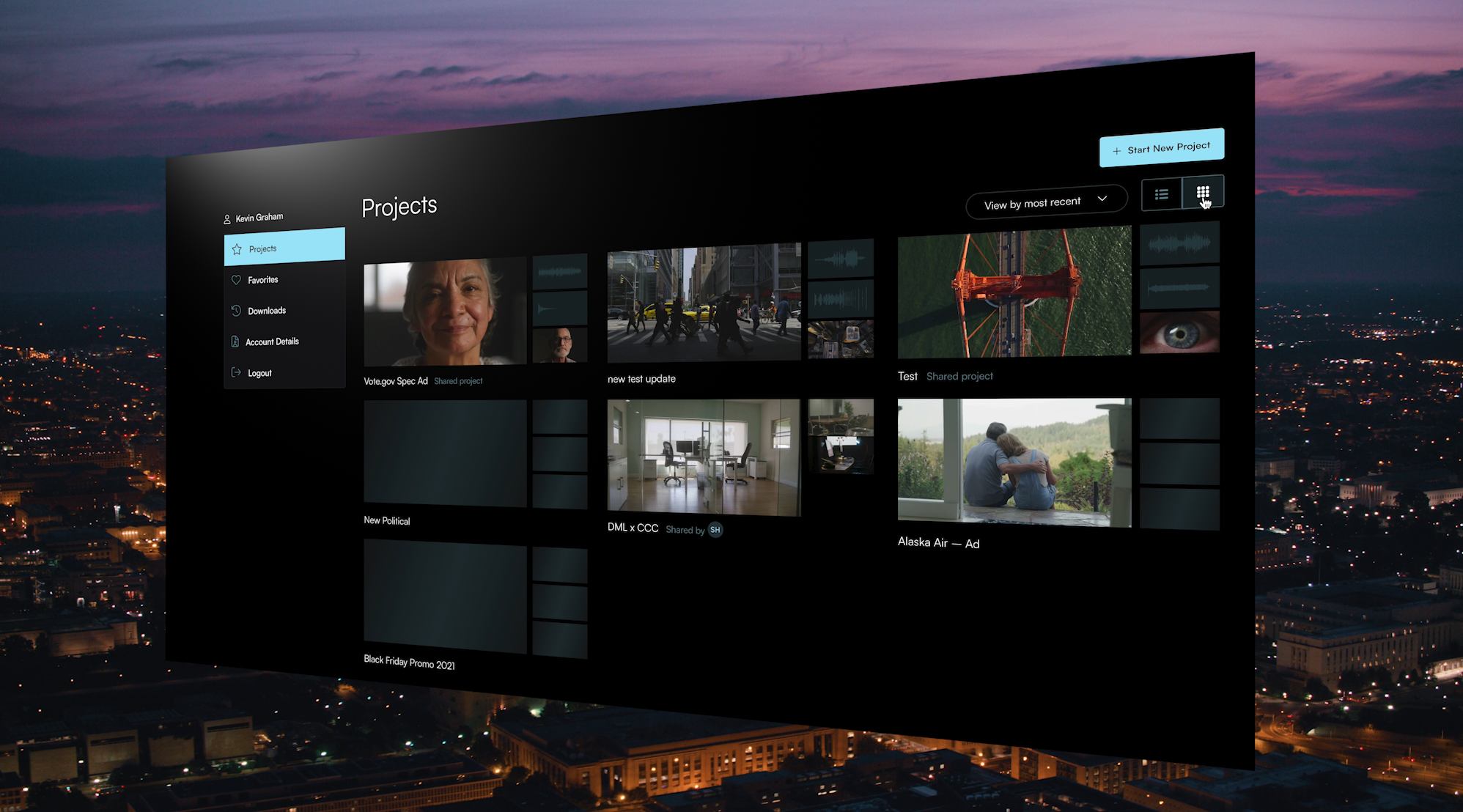
Filmpac’s newly-designed Project Feature is a powerful tool for collaborative video editing. Here’s a quick rundown of how it works.
Continue Reading
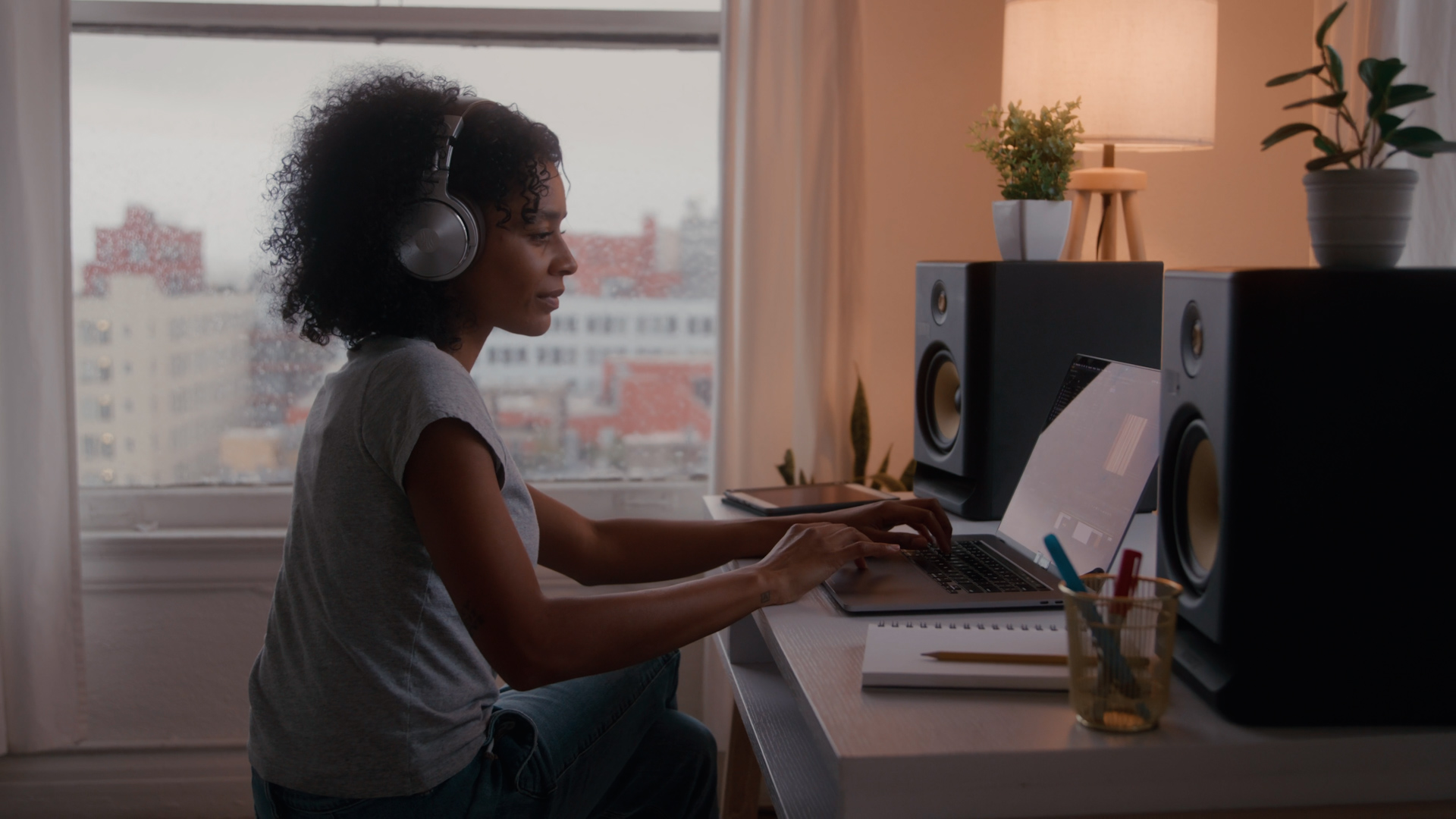
One of the most difficult parts of being a professional filmmaker is effectively managing and budgeting your time.
Continue Reading
Want to make money selling footage through a major stock footage platform like Filmpac? This page will walk you through the processs.
Continue Reading